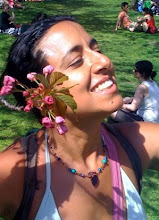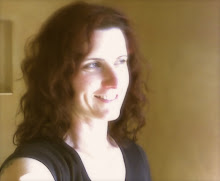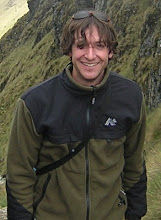
Here's what Janell had to say about our tour: "I love that Asheville has more and more permaculture hot spots. Thanks to the smarties who are creating their lil' urban paradises and for letting us tour 'em: Monica Williams, Bill & Ely Whipple, Steve Arpin, Sunny Keach, Turtle & the Pearson Garden, Issac Dickson & Vance Elementary Schools and Jim Bixby. (We'll have to do round II to catch all the ones we missed.)
I'm particularly inspired by the goomi berries, the bio-methane digester, the Bradford pear tree with 30 varieties of grafts, the grass embanked couch and the hot house full o' figs - yummm!"
Ely showed us how he's making fuel out of compost. Hooked one of these tanks up to a camp stove and made us tea. Well, no, not really, we didn't have time for tea but the fuel did fire the stove. Impressive!
 Then we were off to Hillside Urban Farm where Sunny Keach showed us his abundant gardens where all sorts of delights are cultivated right here in the city on an urban lot 5 minutes from downtown... including figs, tomatoes, a pond, culinary and medicinal herbs, gorgeous poppies and asparagus. Sunny's garden incorporates many permaculture elements like edible landscaping, aquaculture, season extension and rainwater catchment.
Then we were off to Hillside Urban Farm where Sunny Keach showed us his abundant gardens where all sorts of delights are cultivated right here in the city on an urban lot 5 minutes from downtown... including figs, tomatoes, a pond, culinary and medicinal herbs, gorgeous poppies and asparagus. Sunny's garden incorporates many permaculture elements like edible landscaping, aquaculture, season extension and rainwater catchment.
 Terraced beds make use of sloped terrain and hugelkultur beds make use of debris. Hugelkultur is kind of like planting in a decomposed compost pile and it can be done on any scale. Basically, pile woody yard waste, tree trimmings, brush, etc. in a long row, the base of which is usually more carbon stuffs. Then add your more nitrogen 'wastes' - green stuffs, kitchen scraps, etc. Eventually it all breaks down into a nice rich bed. Soil can be added on top to plant in if the mound isn't completely decomposed.
Terraced beds make use of sloped terrain and hugelkultur beds make use of debris. Hugelkultur is kind of like planting in a decomposed compost pile and it can be done on any scale. Basically, pile woody yard waste, tree trimmings, brush, etc. in a long row, the base of which is usually more carbon stuffs. Then add your more nitrogen 'wastes' - green stuffs, kitchen scraps, etc. Eventually it all breaks down into a nice rich bed. Soil can be added on top to plant in if the mound isn't completely decomposed.
 Isaac Dickson School gets kids into the garden and connects them with where our food comes from. The day we visited they were making pizzas in the cob oven with ingredients from their own garden.
Isaac Dickson School gets kids into the garden and connects them with where our food comes from. The day we visited they were making pizzas in the cob oven with ingredients from their own garden.



 Lloyd summed up the day perfectly: "Seeing some of the inspirational permaculture sites around Asheville was food for thought as Ashevillage develops its own site this summer. Having such a kind, caring, and knowledgeable community in Asheville really makes me feel that sustainability here is attainable, with our continued collaborative efforts and exchange of ideas."
Lloyd summed up the day perfectly: "Seeing some of the inspirational permaculture sites around Asheville was food for thought as Ashevillage develops its own site this summer. Having such a kind, caring, and knowledgeable community in Asheville really makes me feel that sustainability here is attainable, with our continued collaborative efforts and exchange of ideas."
 Then we were off to Hillside Urban Farm where Sunny Keach showed us his abundant gardens where all sorts of delights are cultivated right here in the city on an urban lot 5 minutes from downtown... including figs, tomatoes, a pond, culinary and medicinal herbs, gorgeous poppies and asparagus. Sunny's garden incorporates many permaculture elements like edible landscaping, aquaculture, season extension and rainwater catchment.
Then we were off to Hillside Urban Farm where Sunny Keach showed us his abundant gardens where all sorts of delights are cultivated right here in the city on an urban lot 5 minutes from downtown... including figs, tomatoes, a pond, culinary and medicinal herbs, gorgeous poppies and asparagus. Sunny's garden incorporates many permaculture elements like edible landscaping, aquaculture, season extension and rainwater catchment.
 Terraced beds make use of sloped terrain and hugelkultur beds make use of debris. Hugelkultur is kind of like planting in a decomposed compost pile and it can be done on any scale. Basically, pile woody yard waste, tree trimmings, brush, etc. in a long row, the base of which is usually more carbon stuffs. Then add your more nitrogen 'wastes' - green stuffs, kitchen scraps, etc. Eventually it all breaks down into a nice rich bed. Soil can be added on top to plant in if the mound isn't completely decomposed.
Terraced beds make use of sloped terrain and hugelkultur beds make use of debris. Hugelkultur is kind of like planting in a decomposed compost pile and it can be done on any scale. Basically, pile woody yard waste, tree trimmings, brush, etc. in a long row, the base of which is usually more carbon stuffs. Then add your more nitrogen 'wastes' - green stuffs, kitchen scraps, etc. Eventually it all breaks down into a nice rich bed. Soil can be added on top to plant in if the mound isn't completely decomposed.
 Isaac Dickson School gets kids into the garden and connects them with where our food comes from. The day we visited they were making pizzas in the cob oven with ingredients from their own garden.
Isaac Dickson School gets kids into the garden and connects them with where our food comes from. The day we visited they were making pizzas in the cob oven with ingredients from their own garden.

Pearson Garden is the Bountiful Cities Project's model garden. It produces edibles for the community including greens, peas, and tomatoes, to name a few, as well as perennials like the Jerusalem artichoke.

Pearson Garden also has several natural building structues like this lovely cob composting toilet with living roof.

Keri checks out the living roof up close and personal.
 Lloyd summed up the day perfectly: "Seeing some of the inspirational permaculture sites around Asheville was food for thought as Ashevillage develops its own site this summer. Having such a kind, caring, and knowledgeable community in Asheville really makes me feel that sustainability here is attainable, with our continued collaborative efforts and exchange of ideas."
Lloyd summed up the day perfectly: "Seeing some of the inspirational permaculture sites around Asheville was food for thought as Ashevillage develops its own site this summer. Having such a kind, caring, and knowledgeable community in Asheville really makes me feel that sustainability here is attainable, with our continued collaborative efforts and exchange of ideas."
























